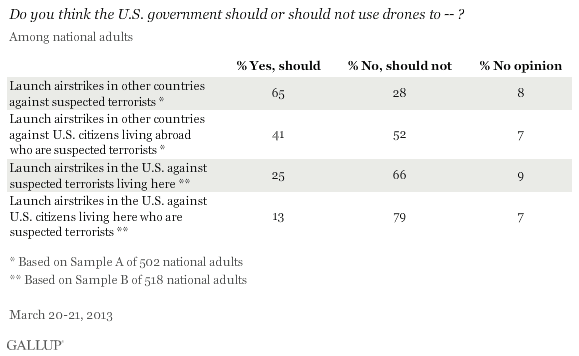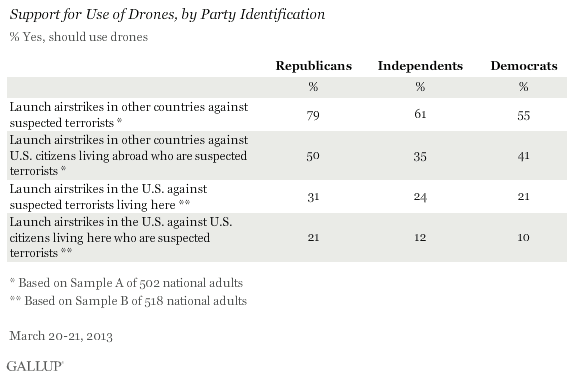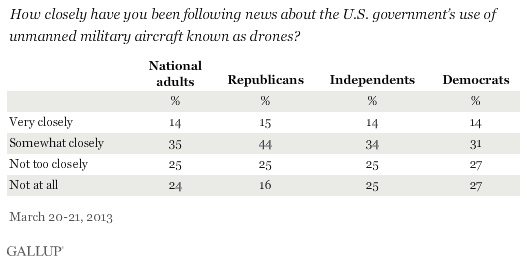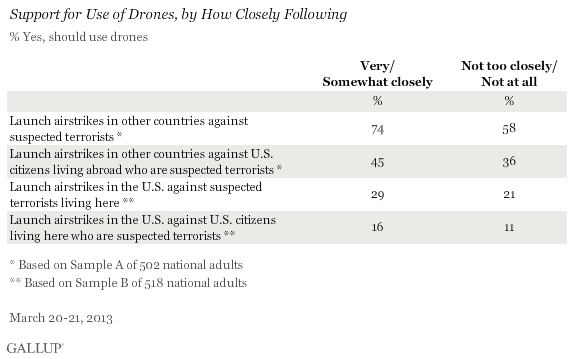WASHINGTON, D.C. -- Nearly two-thirds of Americans (65%) think the U.S. government should use drones to launch airstrikes in other countries against suspected terrorists. Americans are, however, much less likely to say the U.S. should use drones to launch airstrikes in other countries against U.S. citizens living abroad who are suspected terrorists (41%); to launch airstrikes in the U.S. against suspected terrorists living here (25%); and to launch airstrikes in the U.S. against U.S. citizens living here who are suspected terrorists (13%).

These data are from Gallup Daily tracking conducted March 20-21, a few weeks after Sen. Rand Paul, R-Ky., held a 13-hour filibuster of President Barack Obama's nominee to lead the CIA. Sen. Paul pledged to speak until the administration clarified whether the government could conduct a drone strike against a U.S. citizen on domestic soil. Attorney General Eric Holder responded after the filibuster ended that the president does not have the authority to use a drone to kill an American not engaged in combat on U.S. soil.
The survey results suggest that a majority of Americans would agree with previous U.S. drone attacks that have killed suspected terrorists living in other countries such as Iraq, Afghanistan, and Pakistan. However, the data indicate that less than a majority of Americans would have in principle supported the drone attack in the fall of 2011 against American citizens who were suspected terrorists living in Yemen. And the results show that substantial majorities of Americans are opposed to drone airstrikes "in the U.S.," regardless of whether they are against U.S. citizens.
The results on using drones on U.S. soil show less support than was found in one other recent poll conducted by Fox News. That poll first asked all respondents about using drones to target terrorists in foreign countries -- something Americans generally support -- and this could have in turn affected the way in which respondents answered subsequent questions about drone use on U.S. soil.
Gallup asked its drone questions using split half-samples, so those asked about using drones in the U.S. were not first asked about using them overseas, resulting in views not influenced by the context of broader drone use.
Republicans More Likely Than Democrats to Support Drone Use
Republicans are at least somewhat more likely than Democrats and independents to say the U.S. government should use drones in all four circumstances tested in the survey. While a majority in each party says the U.S. government should use drones to launch airstrikes in other countries against suspected terrorists, Republicans (79%) are significantly more likely to say so than are Democrats (55%) and independents (61%).
Half of Republicans say the U.S. government should use drones to launch airstrikes in other countries against U.S. citizens living abroad who are suspected terrorists, compared with 41% of Democrats and 35% of independents who say the same.
Although Republicans are modestly more likely than Democrats or independents to say the U.S. government should use drones in the U.S. against suspected terrorists living here or in the U.S. against U.S. citizens, support is low among all groups.

About Half Following News About Drones Closely
On a relative basis, Americans are not paying a particularly high level of attention to the controversy surrounding the government's use of drones -- 49% are following news about the drones very or somewhat closely, while the same percentage is following the news not too closely or not at all. The 49% "closely following" number is below the 61% average across more than 200 news events that Gallup has measured in this way.

Republicans (59%) are more likely than Democrats (45%) or independents (48%) to say they are following the news about drones very or somewhat closely.
Those Who Are Following Drone News Close More Likely to Support Their Use
Americans who are following news about drones closely are more likely than those who are not following closely to say the U.S. should use drones in each of the four circumstances. In three of the four instances, this is at least partly because those not following the news closely are less likely to have an opinion in either direction. Still, the only circumstance in which a majority of those who are following the news closely say the U.S. should use drones is to launch airstrikes in other countries against suspected terrorists.

Bottom Line
A clear majority of Americans say the U.S. government should use drones to launch airstrikes in other countries against suspected terrorists, but support drops significantly below the majority level when Americans are asked about the use of drones against U.S. citizens, either at home or abroad, or against noncitizens living in the U.S.
Although it was Republican Sen. Paul who filibustered in protest of the potential or possible future use of drones in the U.S., rank-and-file Republicans across the country are actually more supportive of such actions than are independents or Democrats.
And, even with Paul's effort to bring the issue of drones into the national spotlight during his 13-hour filibuster, less than half of Americans are paying very or somewhat close attention to news about the U.S government's use of drones. Americans who are following the news at least somewhat closely are slightly more likely to say the government should use drones in each of the four circumstances.
Survey Methods
Results for this Gallup poll are based on telephone interviews conducted March 20-21, 2013, on the Gallup Daily tracking survey, with a random sample of 1,020 adults, aged 18 and older, living in all 50 U.S. states and the District of Columbia.
For results based on the total sample of national adults, one can say with 95% confidence that the margin of sampling error is ±4 percentage points.
For results based on the sample of 502 national adults in Form A and 518 national adults in Form B, the margins of sampling error are ±6 percentage points.
Interviews are conducted with respondents on landline telephones and cellular phones, with interviews conducted in Spanish for respondents who are primarily Spanish-speaking. Each sample of national adults includes a minimum quota of 50% cellphone respondents and 50% landline respondents, with additional minimum quotas by region. Landline telephone numbers are chosen at random among listed telephone numbers. Cellphones numbers are selected using random digit dial methods. Landline respondents are chosen at random within each household on the basis of which member had the most recent birthday.
Samples are weighted to correct for unequal selection probability, nonresponse, and double coverage of landline and cell users in the two sampling frames. They are also weighted to match the national demographics of gender, age, race, Hispanic ethnicity, education, region, population density, and phone status (cellphone only/landline only/both, cellphone mostly, and having an unlisted landline number). Demographic weighting targets are based on the March 2012 Current Population Survey figures for the aged 18 and older U.S. population. Phone status targets are based on the July-December 2011 National Health Interview Survey. Population density targets are based on the 2010 census. All reported margins of sampling error include the computed design effects for weighting.
In addition to sampling error, question wording and practical difficulties in conducting surveys can introduce error or bias into the findings of public opinion polls.
View methodology, full question results, and trend data.
For more details on Gallup's polling methodology, visit www.gallup.com.
